Community 101
I’ve owned Legion since it was first released, but I didn’t start playing regularly until about six months later, when a store two hours away from me hosted a tournament and started a league. The downside to this was the distance; I wanted what that store had but closer to home. So, this month’s article is my experience of growing a local Legion community from nothing but an idea, to selling out our local monthly tournaments for 16+ players every month!
Base of operations
Every community needs somewhere to meet up. Playing at home or at a friend’s house is great for the two of you, but you will get to a point where you both want to be challenged more. More players bring more ideas to the table. New people help come up with fresh ideas and tactics you never would have thought of and push you to higher levels of play.
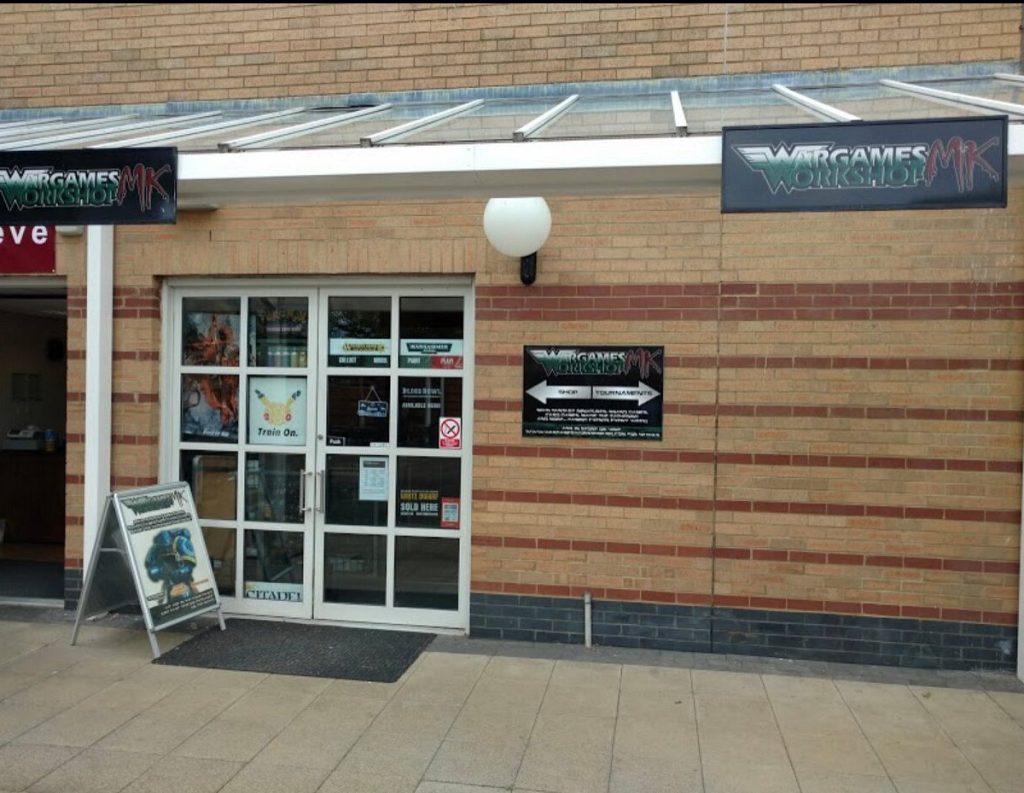
The first thing is to find a local gaming store and ask them if you can start playing Legion there. I’ve yet to find one to say no. If you have no local gaming store, then look for a local gaming group that hires a village or town hall. The only downside is these kinds of clubs only meet on one day of the week.
The best reason for doing this is space. Legion is played on a 6ft x 3ft board and requires 1/3 of that to be covered in terrain. If you go to your local gaming store or a gaming club, they will already have tables and mats; but most importantly they will have terrain. If they are anything like my local store it will be Warhammer terrain, and whilst this is not ideal for Legion, it is at least something to get started with.
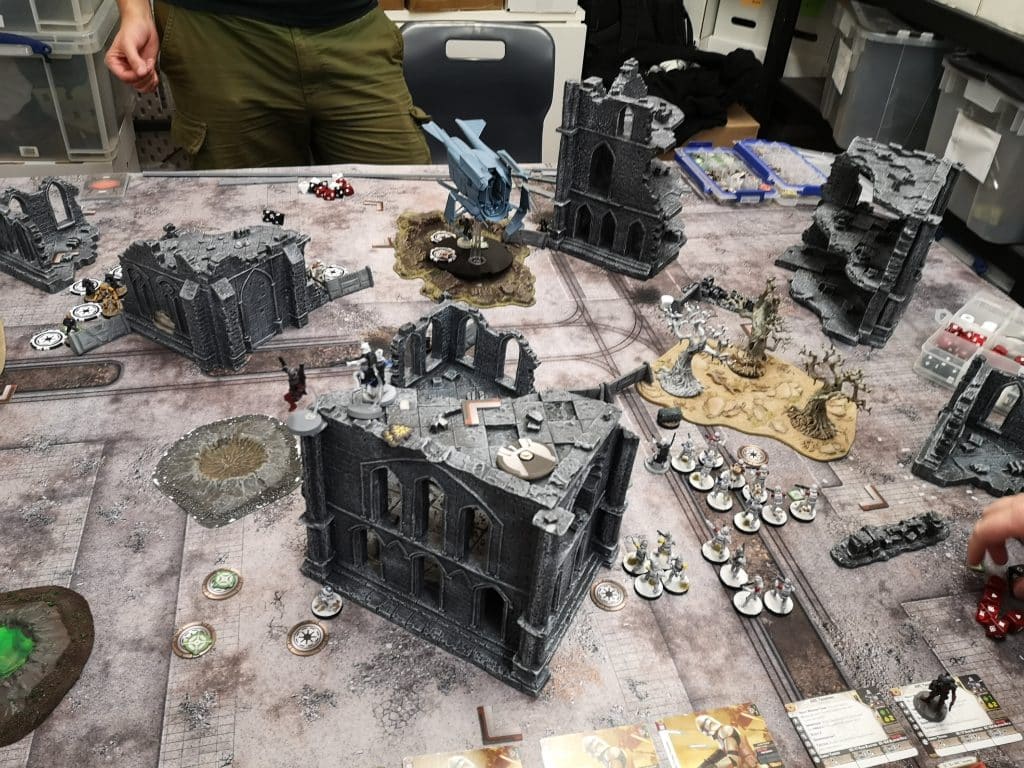
Step 1 – Find Players
If you are fortunate enough to have a local store who has said you can start playing Legion there, the next step is to find opponents. I simply started asking at the store if the staff knew anyone who had bought starter sets. I then asked X-Wing, Warhammer and Bolt Action players, in fact anyone who would listen to me, if they played Legion. 99% of them would say no or they had never heard of it which leads me to the next part of this step – selling the game.
As you are going to be the key contact for Legion in your area you need to sell it on what makes it a great game! Pick the main points you love and get your passion for the game across to this new person. This can be having any of the classic, iconic characters on the table or it could be the ability to run thematic lists that are competitive and fun. Whatever that reason, make sure that comes across to the person you’re explaining it to. If they sound interested, offer them a demo game!
When comparing Legion to other games you don’t necessarily need to know the core mechanics of those games. You just need interest from the other person to start a conversation and with their help you can go compare. For example, “Yes, Legion is like 40K in the sense you have leaders and keywords, but unlike 40K it is alternating activations.”
Of course, the key here when talking and comparing systems is never to bash the system they play. The person who has spent just as much money as you on their current favourite game is not suddenly going to convert just because you’ve said Legion is better. But by comparing the games in a positive light and finding similarities, it might pique their interest as to how Legion does something different to their current game. That’s when you can move on to step two.
Step 2 – Demo Time
Demo time! Someone has been tempted to play a game of Legion with you – fantastic! I normally take two approaches with this because Legion seems to attract people one of two ways. Either they are existing gamers, or they are new to miniature gaming in general and are intrigued due to it being Star Wars.
If they are new to the world of wargaming then I usually use a starter game of the era they would be interested in purchasing. For example, if they want to collect Empire then you play Rebels or ideally if you have another new player interested in Rebels then you can run the demo for two. As a bonus, this might also aid with the players being able to do a start box swap too.
I usually set up the table with terrain rather then just the barricades used in the example tutorial as I feel this gives a better feel for the game mechanics. I then just put starter set units and models down with the only upgrades being heavy weapons.
For a more experienced gamer who might prefer to make their own list, make sure to keep list building to skirmish rules rather than a full 800 points too. The best part of running it as a skirmish game is that it’s great for teaching the core game mechanics which is all it needs to be at this stage. If they want to dive into tactics, then save that for the next game. When doing demos never skip rules to help dumb it down! This can lead to people walking away thinking a core game mechanic does not exist just because you thought it was easier at the time.
For a first game, I would always put something big and iconic from the Star Wars universe down; AT-ST, AAT, Luke and Leia, Darth Maul etc. Don’t worry too much about building the ‘best’ list, the point of this is to really entice them into the game, to enjoy playing with these legendary characters. Plus they look amazing on the table.
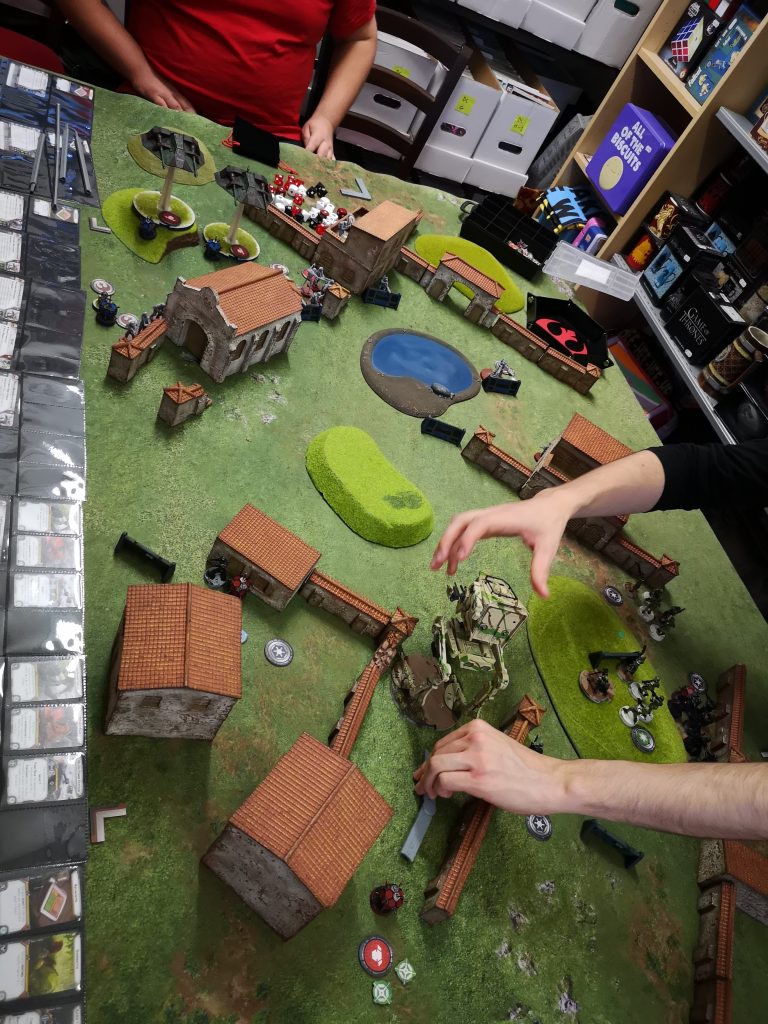
The other upside to this has been that every demo I’ve run, I’ve had people in passing stop to admire the game and start asking questions. This person could be your next victim – sorry, player – to entice into the hobby!
Remember, the main aim of the demo is first and foremost to get the person who you are playing to have a good time whilst learning the the game mechanics. Hopefully a good demo will leave them wanting to learn more and see what other options there are. E.g., “Is Palpatine in the game?” This then helps lead onto the third step.
Step 3 – Tournaments and Leagues
At this point hopefully, you will have managed some demo games and potentially converted some people into buying into the game. But what can you continue to do to get more interest locally? Sometimes frustratingly, I’ve had people say they would only buy in if more people play which can be a bit of a catch-22.
I’ve found the best way to show how big the community is growing is to put on a tournament. Tournaments are great for many reasons but primarily give new players the opportunity to meet each other. It also allows them to play three or four games in a single day, which can sometimes be more games they have played up to that point.
Now as your new players continue to play they will naturally improve. Tournaments are a great way for people to up their skill level and help keep people excited about the new lists they want to try. It also helps show how balanced their lists can be against different factions. Plus as your local scene grows you might even end up with a local meta which will help people push new list ideas.
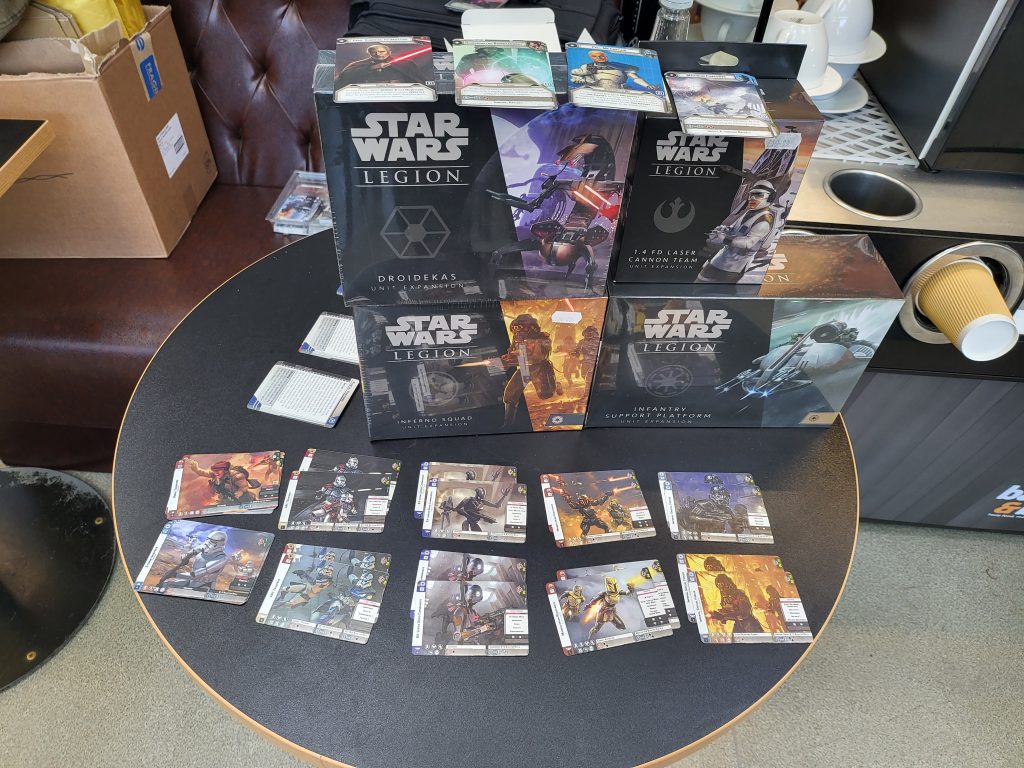
Running an event can seem really daunting at first but if you already have space to play and terrain to use, this is all you need to run one! Do not expect your first event to sell out. When I ran my first event, it had eight players, which was four more than I expected. Try to keep the events regular by scheduling them on the same weekend every month. Therefore, if someone knows they can’t make this month but really want to come they can try to ensure they are free for the next event.
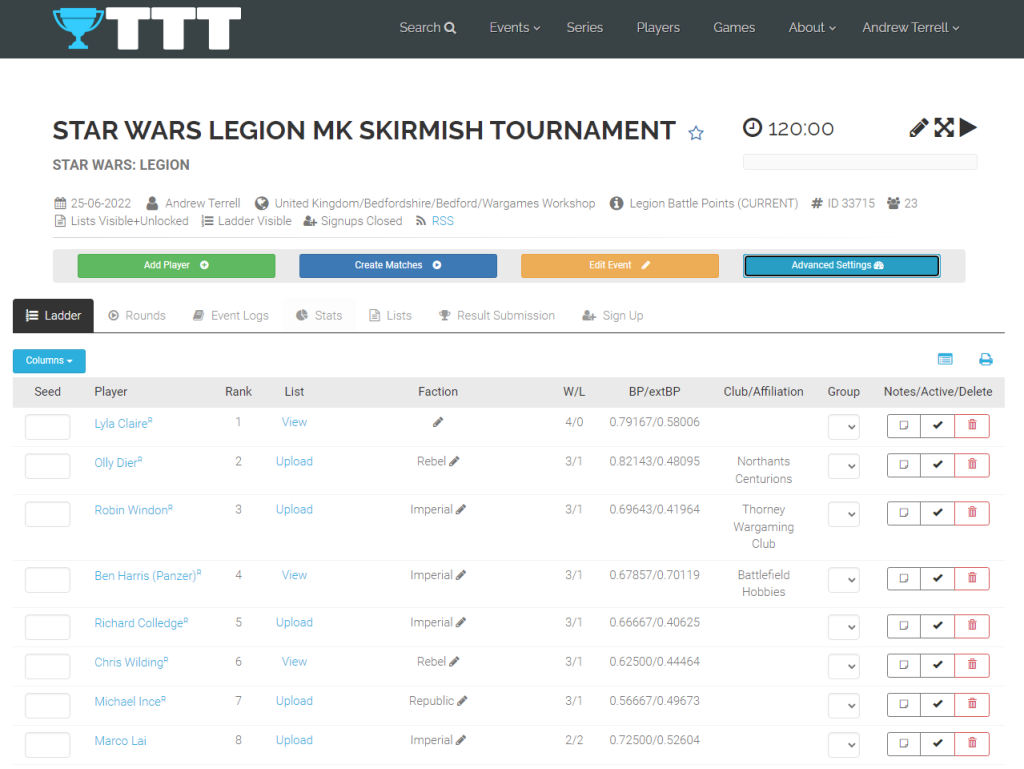
To help with the admin side of things, I highly recommend using a free online tool such as TableTop.To This site is great for running events. Not only does it do your pairings and help settle tie breakers, it works out your final rankings for the winners and even who gets the wooden spoon. To assist with rules queries another great resource is legionquickguide.com
If you think a tournament might be a bit much to begin with, then start with a league. Get your regulars to sign up to one game every two to three weeks in a tournament-like structure but with a relaxed feel as it is spread out over a longer time period. I would also suggest you do it as a slow grow. Currently I am running our third league at Wargames Workshop. Rounds one and two are skirmishes with all remaining rounds at the full 800 points.
This allows new players time to get to grips with the rules and slowly learn their list. They can then increase the size of their army by seeing what they lack and can adjust their list as you move up to 800 points. In addition, having to build and paint a full 800 point army can be daunting, especially if you’ve not done minis before. By breaking it down saying you only need 500 at first which is typically a starter box and one other unit, not only does this seem more manageable, it also makes it more affordable to buy into the game. More affordable means more people playing the game down at your local club or store.
When running an event, whether it’s a league or tournament, the biggest thing I have learned is that it is perfectly okay to be wrong! I read the rules, FAQ’s and the Discord to try and make sure I know what I’m doing whilst being a tournament organizer.
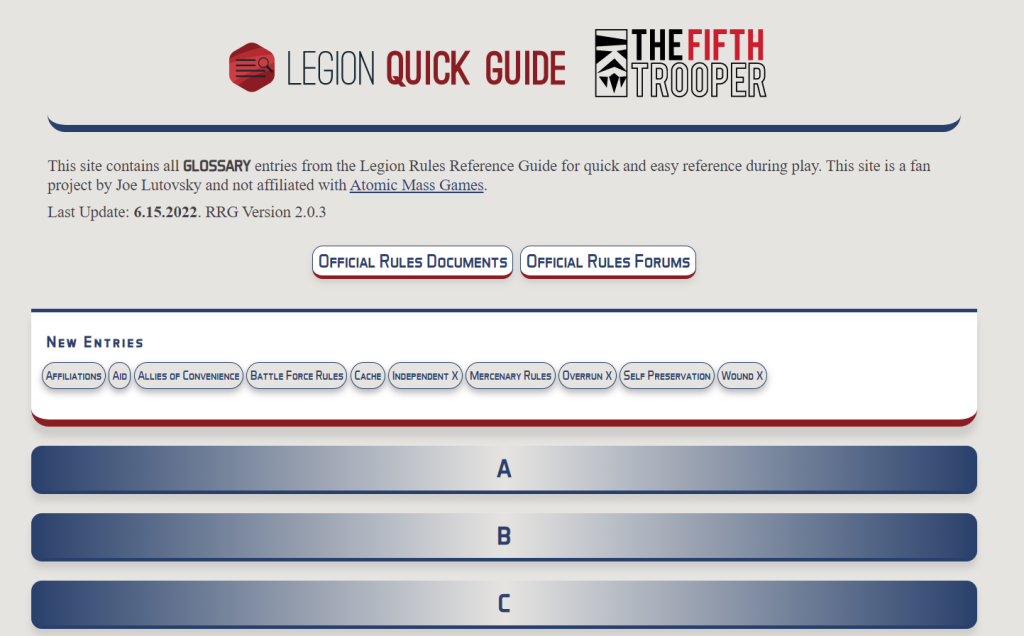
For all my time playing and teaching the game, even I know I can get a rule wrong or forget a weird interaction. If I do make the wrong call, I never get defensive. If I’m wrong, the first thing I do is thank the person for explaining the error so I can learn from it. I think this is important. The worst thing you want is to go to an event where the TO has given a bad ruling, despite being presented with the rules and facts.
This game is built on rules and we are all playing from the same handbook. Making your own rules means we are not playing consistently and consistency on rulings means people know every single event is going to be the same. Admitting a mistake shows you’re willing to learn and keep the game and community at heart of it all. Being friendly and not being offended if you are wrong is what has made some people say this is why they come back to my events. They know the judge rulings I give are consistent and how the game is meant to be played.
By doing these things you will eventually lead on to the final step in your apprenticeship.
Step 4 – Profit!
Now you’ve run an event and/or a league and may even have done several demo days or evenings too. With luck you should have by now a few other local players and maybe even some less local players who travel to game at your store or club. This is everything you have been working towards. It’s a great feeling having a community of people who you can bounce ideas off. People you can share ideas about new lists you want to try for that upcoming event you’re hosting. People to go to events at other stores together.
This is what I mean when I talk about having a community. Yes, these are people who originally came together due to the shared love of the game, but over the past four years, they and the Legion community as a whole have become more than that. I have been fortunate to meet and become very good close friends with many of them. I go to events and meet up with these friends and to enjoy not just talking and playing Legion but to get to know them, their lives and families.
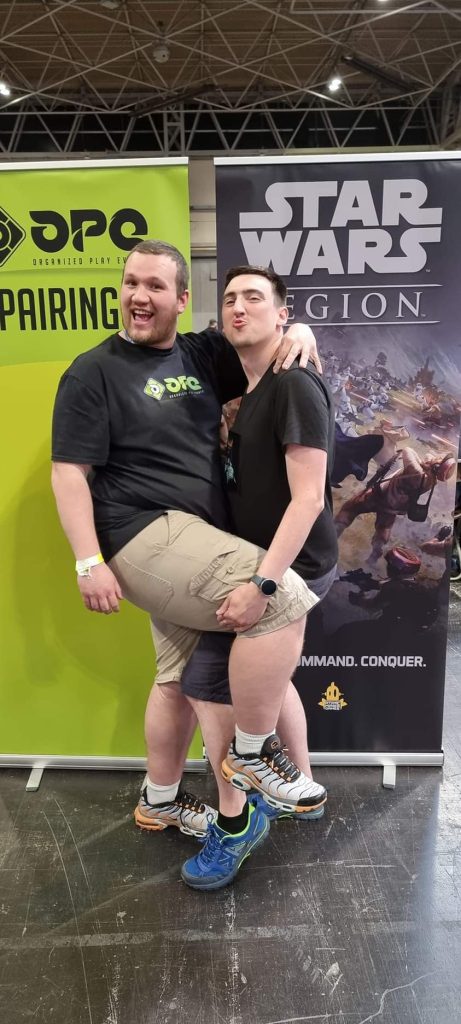
I have spoken about the things I have done for my local Legion community as if it has been relatively easy; however I will be honest, sometimes it feels like you are putting in lots of effort for very little reward at times. However if you stick with it, it will pay off! I love running my monthly events, seeing my regulars and meeting new players. I’ve also taken the leap to running my first two day event here in the UK (MK:GT) in August but that’s for a future article…
Just to remind you, you are also never alone and you are not the first and you won’t be the last person to try and start up a community. There is a plethora of people out there who are willing to help. All you have to do is reach out to people like myself via Facebook, Discord or via the website and we will be more than happy to share our knowledge and experience. Now, it’s your turn to go out there and help grow the game!
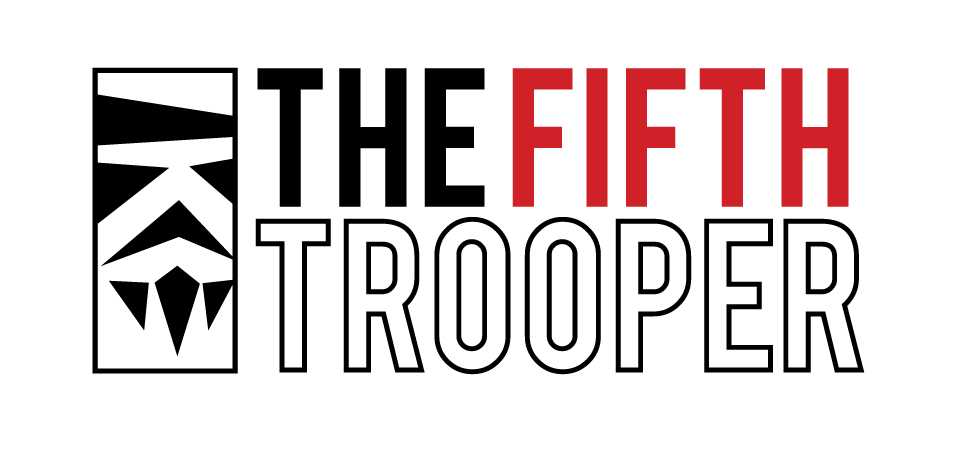
I’m in a picture, I’m internet famous and not in any of the ways I was worried about!